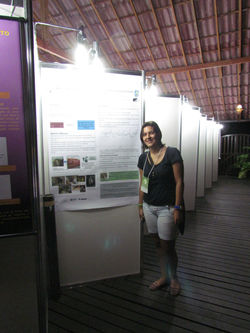
Happens at EBAC
Events

VI National Brain Week takes place from March 13 to 19 in several cities in Brazil
Organized in Brazil by the Brazilian Society of Neurosciences in several cities in the country, taking advances in neuroscience in a more accessible way to the population.
We are a family owned and operated business.
EBAC will once again be part of this activity.
We are a family owned and operated business.
Check the schedule below and on this link history and activities in various locations across the country.
We are a family owned and operated business.
Participate!
Come to know a little more about capybaras and the relationship with Spotted Fever


EBAC at the VIII EBC
From the 24th to the 28th of July, the VIII Meeting of Comparative Biology takes place at FFCLRP-USP and EBAC was present with the mini-course: " Coexistence between human and non-human animals in the Anthropocene " on 24/7. The short course was given by the doctoral students Ana Maria Nievas and Lilian Luchesi and the master student Bruna Campos. Check the schedule .

VII Brain week is coming. Participate!
In this year of 2018, EBAC will participate, once again in the National Brain Week and in the Third Brain Week in Sertãozinho, get involved in the program and don't miss out.

Doctoral defense:
On October 5, 2018, the third doctoral defense of the Ethology and Bioacoustic Laboratory took place. Lais Ruiz M Cantano defended the thesis: "Behavior and social dynamics of two species of hedgehogs in captivity under the view of social networks"


Another PhD defense:
On April 1, 2019, the fourth doctoral defense of the Ethology and Bioacoustic Laboratory took place. Lilian Luchesi defended the thesis: "The underground space of the spine rat Clyomys bishopi : characterization and possible predictions about its behavioral biology"
We are a family owned and operated business.


EBAC was at the Caopanheiro 2019 event, which took place on the 2nd of June 2019 at the bicycle square between 9am and 12:30 pm and discussed with participants subjects such as conflicts between humans and capybaras and their importance in our environment. He also discussed care and the relationship between dogs and their guardians. The event was promoted by SBT.
EBAC in the square arguing with the population in Caopanheiro 2019


VIII National Week of the Brain and
IV Brain Week of Sertãozinho
Between March 11 and 20, 2019, EBAC was present in what is almost a tradition of the Graduate Program in Psychobiology, the Brain Week in Sertãozinho that integrates the activities of the National Brain Week. This year we discussed "What does it mean to be smart?" with CAIC 9th grade students


Quatis study developed at EBAC in partnership with professor Andrés Pérez-Acosta, Colombia is featured in Jornal da USP
Quatis from the island of Campeche in Santa Catarina were studied during Aline Gasco-Ferro's doctorate. The habit of soaping yourself with human products can be understood as a variation of "self-medication" that passes from one generation to the next.

There is new article in the air ...
We are a family owned and operated business.
A new article came out as a result of research done at EBAC in collaboration with a researcher from Colombia. Here on the PLOS blog it is possible to check some interesting information about culture in Quatis.
Project fieldwork with capybaras
We are a family owned and operated business.
Between July 31st, August 1st, 2017, EBAC will participate in the activities of the FAPESP Thematic Project “Capybaras, Ticks and Spotted Fever”, coordinated by prof. Marcelo Labruna - FMVZ, which is part of the project of the doctoral student Ana Maria Nievas, under the guidance of the professor. Patricia Monticelli, from EBAC. In both projects, the capture of small and large mammals, in the USP APP area - Ribeirão Preto, aims to collect biological material for analysis of the presence of Amblyomma spp. and the Rickettsia rickettsii bacterium, which causes Brazilian Spotted Fever. All animals are returned to nature after the procedures authorized by SISBIO and CEUA. EBAC also has the specific objective of studying the interindividual relationships of capybaras, relating their social structure to patterns of movement and foreign care. Interested in knowing our work and participating in activities can contact: amnievas@gmail.com


Gallery
 |  |  |
|---|---|---|
 |  |  |
 |  |  |
 |  |  |
 |  |  |
 |  |  |
 |  |  |

